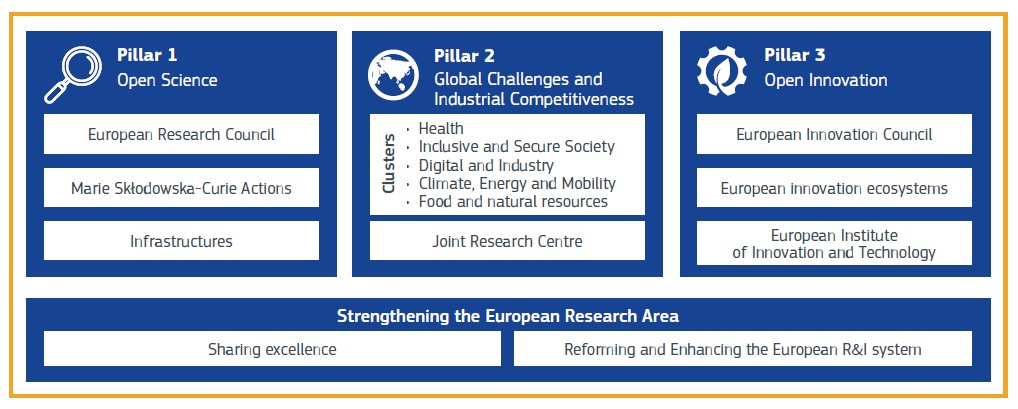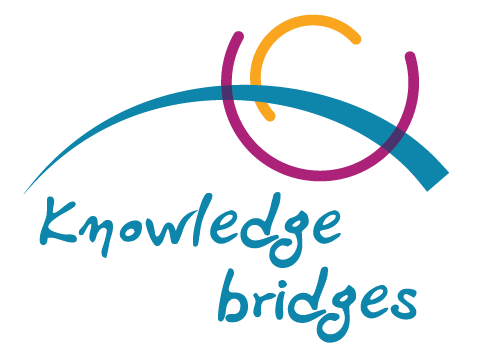Category: Generally
Horizon Europe: 100 billion. Euro for research and innovation in the ambitious new EU programme
27.06.2018
The European Union’s new research and innovation programme for 2021-2027, called Horizon Europe, was announced on 7 June by the European Commission. The programme, which is the most ambitious research and innovation programme to date, is expected to build on the achievements and success of the currentHorizon 2020programme, and keep the EU at the forefront of global innovation. For the next long-term EU budget for 2021-2027, the Commission proposes to allocate €100 billion for the period 2021-2027. in research and innovation.
Around two-thirds of Europe’s economic growth in recent decades has been driven by innovation. Horizon Europe is expected to generate new and more knowledge and technologies, promoting scientific excellence, and is also expected to have a positive impact on growth, trade and investment, as well as a significant social and environmental impact. Every euro invested by the programme can potentially generate a return of up to €11 on GDP within 25 years. The Union’s investments in R&D are expected to directly generate an estimated immediate benefit of up to 100,000 jobs in R&D activities during the “investment phase” (2021-2027).
Commission Vice-President Yirky Katainen, responsible for Employment, Growth, Investment and Competitiveness, said: “Investing in research and innovation is investing in Europe’s future. EU funding has allowed teams from different countries and scientific disciplines to work together and make breakthroughs we had not imagined, making Europe a global leader in research and innovation. With Horizon Europe, we want to build on this success and continue to make a real contribution to the lives of citizens and society as a whole.“.
Carlos Moeda, Commissioner for Research, Science and Innovation, said: “Horizon 2020 is one of Europe’s greatest successes. The new Horizon Europe programme aims even higher. In this context, we want to increase funding for the European Research Council to strengthen the EU’s global scientific excellence and reinvigorate citizen engagement by defining ambitious new EU research missions. We also propose the creation of a new European Innovation Council to modernise funding for pioneering innovation in Europe.“.
Alongside the promotion of scientific excellence through the European Research Council (ERC) and the Marie Skłodowska-Curie fellowships and exchanges, Horizon Europe will introduce the following key features:
- An
European Innovation Council
(EaS) to help the EU become a leader in innovation that creates new markets: the Commission’s proposal will create a one-stop shop to move the most promising and high-potential innovative technologies from the lab to commercial applications, and to help the most innovative start-ups and companies develop their ideas on a larger scale. The new ESF will help identify and fund fast-moving, high-risk innovations with high potential to create new markets. It will provide direct support to innovators through two main financial instruments, one for early-stage and another for development and commercialisation. It will operate in a complementary way to the European Institute of Innovation and Technology.
- New EU-wide research and innovation missions focusing on societal challenges and industrial competitiveness: under Horizon Europe: the Commission will launch new missions with bold, ambitious objectives and high European added value to address issues that affect our daily lives. These can range from fighting cancer to clean transport or ridding the oceans of plastics. These missions will be planned together with citizens, stakeholders, the European Parliament and Member States. The concept of missions in innovation was first proposed by the internationally renowned economist Mariana Mazzucato, is the subject of recent study on behalf of the EU and has been adopted as a concept for setting targets in such thematic areas in order to create maximum added value in the lives of European citizens. Each objective implemented should have a positive impact on improving health, for example, nutrition, the environment of citizens, the migration problem, etc.
- Maximising innovation potential across the EU: support will be doubled for Member States that are lagging behind in their efforts to make the most of their national research and innovation potential. In addition, new synergies with the Structural Funds and the Cohesion Fund will facilitate the coordination and combination of funding and help regions to embrace innovation.
- Greater openness: The principle of “open science” will become the way Horizon Europe will operate, requiring open access to publications and data. This will help market penetration and increase the innovation potential of the results produced with EU funding.
- New generation European partnerships and increased cooperation with other EU programmes: Horizon Europe will streamline the number of partnerships that the EU co-programs or co-funds with partners such as industry, civil society and financial institutions to increase their effectiveness and impact in achieving Europe’s policy objectives. Horizon Europe will promote effective and operational links with other future EU programmes such as Cohesion Policy, the European Defence Fund, the Digital Europe programme and the Connecting Europe Facility, as well as with the international ITER fusion energy programme.
The
Joint Research Centre
The Joint Research Centre (JRC), the Commission’s science and knowledge service, will continue to provide scientific advice, technical support and specialised research.
The proposed budget allocations of €100 billion. for the period 2021-2027, include €97.6 billion. EUR 2.4 billion under Horizon Europe (of which EUR 3.5 billion will be made available under the InvestEU fund) and EUR 2.4 billion under Horizon Europe (of which EUR 3.5 billion will be made available under the InvestEU fund). for the Euratom research and training programme.
The Euratom programme, which funds research and training activities in the fields of nuclear safety, nuclear security and radiation protection, will focus more on nuclear applications outside the power generation sector, such as healthcare and medical equipment, and will also support the mobility of nuclear researchers under the Marie Skłodowska-Curie actions.

The structure of the new programme is as follows:
Pillar 1: Open Science
This pillar, with a budget of €25.8 million, will be financed by the European Commission. It includes the activities of the European Research Council (ERC), the Marie Skłodowska-Curie Actions and the European Research Infrastructures.
Pillar 2 : Global challenges and industrial competitiveness
This pillar, with a budget of €52.7 million, will be financed by the European Commission. It includes activities to support the deployment of innovative solutions to address global challenges in 5 broad clusters: health, inclusive and sustainable development. Health, Inclusive and Secure Societies, Digitalization and Industry, Climate-Energy-Transport, Food and Natural Resources. The activities of the Joint Research Centre are also included in this section.
Pillar 3: Open Innovation
This pillar, with a budget of €13.5 million, will be financed by the European Commission. It includes three (3) categories of activities to support all types of innovation, including that which creates new markets: European Innovation Council, European Innovation Ecosystems and the European Institute of Innovation and Technology (EIT).
Horizontal Pillar: “Strengthening the European Research Area”
The activities of this pillar, with a budget of €2.1 million, will be carried out in the framework of the European Commission’s will provide horizontal support for the implementation of the programme by strengthening Europe’s R&D capacities and the seamless circulation of knowledge and highly qualified human resources.
Background
The Horizon Europe proposal builds on the success of Horizon 2020, the largest research and innovation framework programme to date, with a budget of €77 billion. for seven years (2014-2020). Its mid-term evaluation showed that the programme is on track to create jobs and growth, address major social challenges and improve the lives of citizens. It has shown that the programme has a clear European added value and produces demonstrable benefits compared to support at national or regional level. Horizon 2020 researchers have contributed to major discoveries such as exoplanets, the Higgs boson and gravitational waves, and at least 19 Nobel Prize-winning researchers have received EU research funding before or after their award. According to May 2018 figures, the programme has supported over 18,000 projects, through the allocation of more than €31 billion. euro.
Next steps
A swift agreement on the overall long-term EU budget and sectoral proposals is vital if EU funds are to start delivering concrete results as soon as possible. Any delays would prompt Europe’s brightest minds to seek opportunities elsewhere. This would entail the loss of thousands of research jobs and damage Europe’s competitiveness.
Reaching agreement in 2019 on the next long-term budget will help ensure a smooth transition from the current budget (2014-2020) to the new one, and will ensure predictability and continuity of funding for the benefit of all citizens. Horizon Europe will start its work on 1 January 2021.

The name of the new Research & Innovation Programme
The name of Horizon Europe was chosen, according to Commissioner Carlos Moedas, to refer to two strong symbols, excellence and collegiality. Specifically:
- The first synonym, “Horizon”, refers to excellence and the recognition of Europe’s global leadership in research and innovation programmes. The new programme, building on the success of the past, should build on this brand name in the future.
- The second compound, “Europe”, refers to “strength in union”, the collective strength of the 27 member states, despite the socio-economic and political crisis Europe is going through. It also points to the pride in the achievements of this collective project and the EU’s added value, which creates the conditions for a greater impact than the individual efforts of Member States.
EKT as the National Contact Point for European research programmes
The National Documentation Centre (EKT) has been the National Contact Point for European research, technology and innovation programmes since 1992 (current programme: Horizon 2020). Covering all stages of research projects, from the preparation of the proposal to the implementation and exploitation of the research results, EKT’s services include information and advisory services, the operation of a support office, the development and distribution of information material, the organisation of events and seminars, the identification of partners for the formation of consortia and the joint submission of proposals, the recording of national participation and the publication of statistics and performance indicators.
